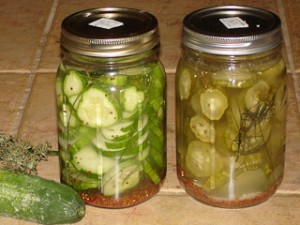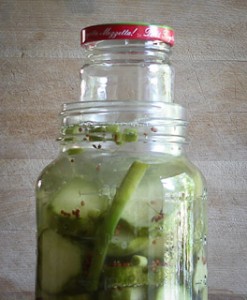
photo by Manon Gaudreau: Pickles – before and after 5 days of fermentation
recipe from Nourishing Traditions cookbook by Sally Fallon
For a 1 quart jar
4-5 pickling cucumbers or 15-20 gherkins
1 TBSP mustard seeds
2 TBSP fresh dill, snipped
1 TBSP sea salt
4 TBSP homemade whey (if not available, use an additional 1 TBSP of salt)
1 cup filtered water (warm enough to easily dissolve salt)
Wash cucumbers well and place in a quart-sized, wide-mouth Mason jar. Combine remaining ingredients and pour over cucumbers, adding more salt-water if necessary to cover the cucumbers. The top of the liquid should be at least 1 inch below the top of the jar. Cover tightly and keep at room temperature for about 3 days before transferring to cold storage. If pickles are cut into 1/4-inch slices they will be ready for cold storage after 2 days at room temperature.
 Make sure the cucumbers are submerged in the liquid, and that no air pockets remain in the jar , as exposure to air promotes development of mold. So pack the cucumbers and press them down under the liquid. If need be, for the first 3 days of fermentation at room temperature, keep a weight on top of the cucumbers, such as a wooden disk, or a small glass bottle that fits inside the mouth of the pickling jar, or a closed plastic bag filled with salt-water (in case its leaks), to keep the ferments immersed. A little space between the edge of the jar and the weight is acceptable, as long as only the liquid is exposed. Then remove the weight, put an air-tight cover on top of the jar, and transfer to the refrigerator or to cold storage, where fermentation will continue. It takes a few weeks for the cucumbers to be fermented and ready to eat. But then they will keep for months.
Make sure the cucumbers are submerged in the liquid, and that no air pockets remain in the jar , as exposure to air promotes development of mold. So pack the cucumbers and press them down under the liquid. If need be, for the first 3 days of fermentation at room temperature, keep a weight on top of the cucumbers, such as a wooden disk, or a small glass bottle that fits inside the mouth of the pickling jar, or a closed plastic bag filled with salt-water (in case its leaks), to keep the ferments immersed. A little space between the edge of the jar and the weight is acceptable, as long as only the liquid is exposed. Then remove the weight, put an air-tight cover on top of the jar, and transfer to the refrigerator or to cold storage, where fermentation will continue. It takes a few weeks for the cucumbers to be fermented and ready to eat. But then they will keep for months.
Lacto-fermented cucumbers are very refreshing and far less acid than pickles conserved in vinegar. They were traditionally accompanying sausages and preserved meats; a wise habit since this vegetable is able to dissolve precipitates of uric acid and thus prevents the formation of stones, often caused by meats and sausages, foods rich in uric acid. Claude Aubert Les aliments Fermentés Traditionnels.

Recent Comments